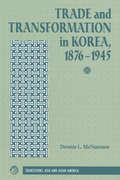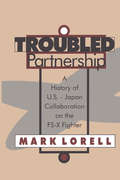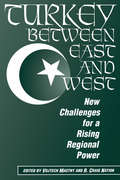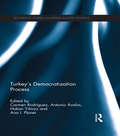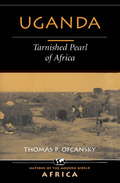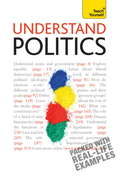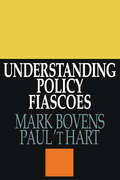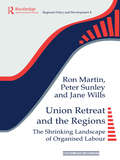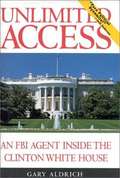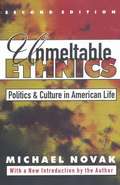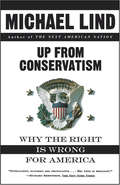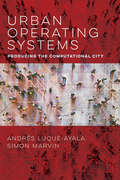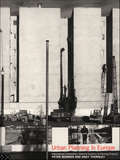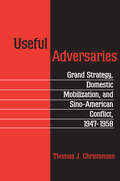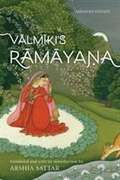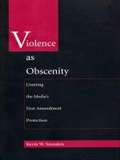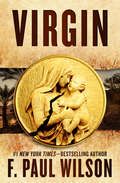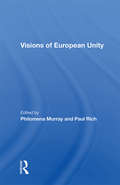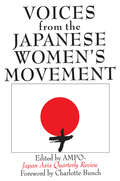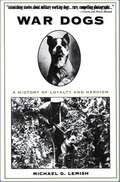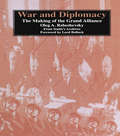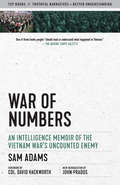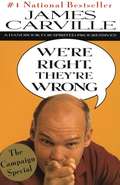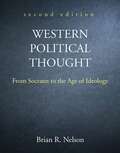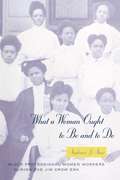- Table View
- List View
Trade And Transformation In Korea, 1876-1945
by Dennis McnamaraExploring the interaction among system, state, and society, this book illuminates the social and economic history of late nineteenth- and early twentieth-century colonial Korea. Dennis McNamara argues that transformation within and trade abroad, led by rice exports, spurred Korea's shift from isolation to inclusion in a modem regional system. In hi
Troubled Partnership: History of US -Japan Collaboration on the FS-X Fighter
by Mark LorellDuring World War II. Japanese fighters, such as the famed Zero, were among the most respected and feared combat aircraft in the world. But for decades following the defeat of Japan in 1945, a variety of political and economic factors prevented Japan from developing its own modern national fighter. This changed in the 1980s. Japan began independently developing its first world-class fighter since World War II. After several years of contentious negotiations, the Japanese agreed to work with the United States to cooperatively develop a minimally modified F-16, the FS-X. The new fighter, however, has evolved into a world-class aircraft developed largely by Japanese Industry primarily due to errors committed by the U.S. side. By the fall of 1995, fifty years after the end of World War II, the Zero for the 1990s will have made its first flight, catapulting Japan into the elite ranks of nations capable of developing the most advanced weapon systems. In Troubled Partnership, Mark Lorell traces the evolution of the FS-X, disclosing the conflicting economic and security objectives advanced by U.S. officials, the flawed U.S. policy of technology reciprocity, and the challenges of International collaboration. Its deep Intimacy with the Interplay of policy and economy will make this volume of Intense Interest to political Scientists, military studies specialists, historians, and government officials.
Turkey Between East And West: New Challenges For A Rising Regional Power
by Vojtech MastnyLinked by ethnic and religious affinities to two post-Cold War crisis areas—the former Soviet Union and Yugoslavia—Turkey is positioned to play an influential role in the promotion of regional economic cooperation and in taking new approaches to security. In this book, experts from Turkey, Europe, and the United States address key aspects of Turkey
Turkey's Democratization Process (Routledge Studies in Middle Eastern Politics)
by Carmen Rodríguez Antonio Ávalos Hakan Yılmaz Ana I. PlanetSince the end of the 1980 coup d’état Turkey has been in the midst of a complex process of democratization. Applying methodological pluralism in order to provide a comprehensive analysis of this process in a Turkish context, this book brings together contributions from prominent, Turkish, English, French, and Spanish scholars. Turkey’s Democratization Process utilises the theoretical framework of J.J. Linz and A.C. Stepan in order to assess the complex process of democratization in Turkey. This framework takes into account five interacting features of Turkey’s polity when making this assessment, namely: whether the underlying legal and socioeconomic conditions are conducive for the development of a free and participant society; if a relatively autonomous political society exists; whether there are legal guarantees for citizens’ freedoms; if there exists a state bureaucracy which can be used by a democratic government; and whether the type and pace of Turkish economic development contributes to this process. Examining the Turkish case in light of this framework, this book seeks to combine analyses that will help assess the process of democratization in Turkey to date and will be of interest to scholars and researchers interested in Turkish Politics, Democratization and Middle Eastern Studies more broadly.
Uganda
by Thomas P OfcanskyUganda, a landlocked nation in East Africa, was known during colonial times as the "Pearl of Africa," largely because of its pleasant climate and rich land. For most of the postindependence period, however, Uganda was one of the most brutal and violent nations in Africa. In 1986, a new government seized power, promising to restore internal stability and economic prosperity. Since then, Uganda has gradually become a model for other African states struggling to improve the lives of their citizens. In this broad survey, Thomas P. Ofcansky examines the political, economic, and social themes that have shaped Ugandan history. He inspects the impact of British colonial rule, investigates the emergence of the independence movement after World War II, and analyzes the factors that contributed to the collapse and decay of Ugandan society after Idi Amin's seizure of power in 1971. The author then explores the successes, failures, and prospects of Uganda's current government. In his conclusion, Ofcansky considers the difficulties facing a nation divided by ethnic, religious, and regional cleavages and argues that Ugandan leaders must work to establish a society in which all Ugandans benefit or face the possibility of a return to anarchy.
Understand Politics: Teach Yourself (Teach Yourself General)
by Peter JoyceThis book is a complete introduction to politics and the workings of government, Focusing on the institutions of government and the political systems operating in liberal democratic states, it will give you an understanding of the operations of these political systems, the key political themes and the differences that exist between them. Using contemporary examples from all over the world, this title is essential reading for all those who want to know more about our world today. NOT GOT MUCH TIME? One, five and ten-minute introductions to key principles to get you started. AUTHOR INSIGHTS Lots of instant help with common problems and quick tips for success, based on the author's many years of experience. TEST YOURSELF Tests in the book and online to keep track of your progress. EXTEND YOUR KNOWLEDGE Extra online articles at www.teachyourself.com to give you a richer understanding of psychology. FIVE THINGS TO REMEMBER Quick refreshers to help you remember the key facts. TRY THIS Innovative exercises illustrate what you've learnt and how to use it.
Understanding Policy Fiascoes
by Paul 't HartA crisis of governance is widespread in western societies. Public administration is caught in a web of personal and organizational inter-dependencies that require continuous awareness and readjustment on the part of its practitioners. Understanding Policy Fiascoes applies policy analysis to come to terms with policy fiascoes, with a full appreciation of its limits. Despite the fact that policy failures may seem universal, they are in fact better understood as social, political and academic constructions. Bovens and 'tHart trace how and why certain episodes of public policymaking become labeled as "fiascoes." They highlight the analytical and political biases that shape our judgments of policy outcomes and the performance of policymakers and institutions.When put in their proper historical, institutional, and policymaking perspective, many policy fiascoes could easily have turned out quite differently. The authors show that the fact that these policy episodes unfolded as they did does not mean that they were inevitable. Careful analysis indicates that a whole series of variables, if not always manageable, can, through careful configurations of decisions, alter the course and outcomes of policies and programs, as well as the post-hoc judgments made about them.In examining public policymaking, certain questions arise: If public policymaking has failed so miserably, what does this tell us about the state of policy analysis? While policymakers are facing a crisis of legitimacy, policy analysis have been forced to reconsider the validity o their knowledge claims and the extent of their impact on the practice of policymaking. Understanding Policy Fiascoes will provide social scientists, policymakers, and political scientists with compelling perspectives on old problems and a path-breaking way to handle new problems.
Union Retreat and the Regions: The Shrinking Landscape of Organised Labour (Regions and Cities #Vol. 8)
by Jane Wills Ron Martin Peter SunleySince the beginning of the 1980s, British trade unions have experienced a dramatic retreat, marked by rapidly falling membership and declining industrial power. The authors examine the regional dimensions of this retreat of organised labour, paying particular attention to: The resilience of the unions' historical heartland areas. The impact of economic restructuring on local union traditions. The shrinking landscape of industrial militancy. The geographical decentralization of the new industrial relations. The link between these factors and the more general debate on regional development and regional labour markets. An important synthesis of economic geography and industrial relations work, this book marks a major contribution towards the newly emerging field of labour geography
Unlimited Access: An FBI Agent Inside the Clinton White House
by Gary AldrichGary Aldrich served both Presidents Bush and Clinton in the White House as a private investigator whose task it was to check the backgrounds and character of the president's choices for top-level government positions. What he found will shock you. Throughout Unlimited Access, Aldrich relies on eyewitness testimony: his own, and that of other White House insiders. He shows the American public that the Clinton staff-characterized by arrogance and ignorance-as hostile to the military, the FBI, the CIA, and the Secret Service. Unlimited Access is an insider's electrifying expose of a presidential administration gone awry.
Unmeltable Ethnics: Politics And Culture In American Life (Second Edition)
by Michael NovakThis new, enlarged edition of an influential book--originally published in 1972 as The Rise of the Unmeltable Ethnics--extends the author's wise and generous view of ethnicity. Its aim "is to raise consciousness about a crucial part of the American experience: to involve each reader in self-inquiry. Who, after all, are you? What history brought you to where you are? Why are you different from others?" But the point of such inquiry is civility: "The new ethnic consciousness embodied in this book delights in recognition of subtle differences in the movements of the soul. It is not a call to separatism but to self-consciousness. It does not seek division but rather accurate, mutual appreciation."
Up from Conservatism
by Michael LindFor nearly a decade, Michael Lind worked closely as a writer and editor with the intellectual leaders of American conservatism. Slowly, he came to believe that the many prominent intellectuals he worked with were not the leaders of the conservative movement but the followers and apologists for an increasingly divisive and reactionary political strategy orchestrated by the Republican party. Lind's disillusionment led to a very public break with his former colleagues on the right, as he attacked the Reverend Pat Robertson for using anti-Semitic sources in his writings. In Up From Conservatism, this former rising star of the right reveals what he believes to be the disturbing truth about the hidden economic agenda of the conservative elite. The Republican capture of the U. S. Congress in 1994 did not represent the conversion of the American public to conservative ideology. Rather, it marked the success of the thirty-year-old "southern strategy" begun by Barry Goldwater and Richard Nixon. From the Civil War to the civil rights revolution, the southern elite combined a low-wage, low-tax strategy for economic development with a politics of demagogy based on race-baiting and Bible-thumping. Now, Lind maintains, the economic elite that controls the Republican party is following a similar strategy on a national scale, using their power to shift the tax burden from the rich to the middle class while redistributing wealth upward. To divert attention from their favoritism toward the rich, conservatives play up the "culture war," channeling popular anger about falling real wages and living standards away from Wall Street and focusing it instead on the black poor and nonwhite immigrants. The United States, Lind concludes, could use a genuine "one-nation" conservatism that seeks to promote the interests of the middle class and the poor as well as the rich. But today's elitist conservatism poses a clear and present danger to the American middle class and the American republic.
Urban Operating Systems: Producing the Computational City (Infrastructures)
by Simon Marvin Andres Luque-AyalaAn exploration of the modest potentials and serious contradictions of reconfiguring urban life through computational operating systems.A new wave of enthusiasm for smart cities, urban data, and the Internet of Things has created the impression that computation can solve almost any urban problem. Subjecting this claim to critical scrutiny, in this book, Andrés Luque-Ayala and Simon Marvin examine the cultural, historical, and contemporary contexts in which urban computational logics have emerged. They consider the rationalities and techniques that constitute emerging computational forms of urbanization, including work on digital urbanism, smart cities, and, more recently, platform urbanism. They explore the modest potentials and serious contradictions of reconfiguring urban life, city services, and urban-networked infrastructure through computational operating systems.
Urban Planning in Europe: International Competition, National Systems and Planning Projects
by Peter Newman Andy ThornleyUrban planning is undergoing a period of transformation across Europe, with a major trend towards increased urban competition, national deregulation and greater private sector influence.Urban Planning in Europe is the first comprehensive analysis of the influence of countries is developed, presenting the similarities and differences of each country's national planning system. The authors use detailed case studies to explore planning policies in a range of European cities, and discuss the social and environmental objectives that influence today's urban planner.Urban Planning in Europe is an essential guide to contemporary European planning projects and highlighting opportunities for innovation which contain vital lessons for the future of urban decision making.
Useful Adversaries: Grand Strategy, Domestic Mobilization, and Sino-American Conflict, 1947-1958 (Princeton studies in international history and politics)
by Thomas J. ChristensenTruman's limited-containment strategy toward the USSR and Mao's self-strengthening programs during the Great Leap Forward. Christensen also explores how such low-level conflicts can escalate, as they did in Korea, despite leaders' desire to avoid actual warfare.
Valmiki's Ramayana
by ValmikiValmiki's Ramayana, composed as early as 500 BCE, remains a story that speaks to every generation and continues to enthral millions of people in the Subcontinent and beyond. The noble prince Rama is exiled from Ayodhya on his stepmother's whim, and his loyal brother Lakshmana and beautiful wife, Sita, follow him into the forest despite the many dangers it holds. But when Sita is kidnapped by Ravana, king of the rakshasas, Rama must go deep into himself to find the physical and emotional resources he needs to rescue her. Apart from exploring the fundamental human question of how to be good, the Ramayana is also the story of a god who comes to earth to establish righteousness. The tension between Rama's essentially divine nature and his all too human trials makes this one of the most compelling epics in world literature.
Violence As Obscenity: Limiting the Media’s First Amendment Protection
by Kevin W. SaundersThis timely and accessible volume takes a fresh approach to a question of increasing public concern: whether or not the federal government should regulate media violence. In Violence as Obscenity, Kevin W. Saunders boldly calls into question the assumption that violent material is protected by the First Amendment. Citing a recognized exception to the First Amendment that allows for the regulation of obscene material, he seeks to expand the definition of obscenity to include explicit and offensive depictions of violence.Saunders examines the public debate on media violence, the arguments of professional and public interest groups urging governmental action, and the media and the ACLU's desire for self-regulation. Citing research that links violence in the media to actual violence, Saunders argues that a present danger to public safety may be reduced by invoking the existing law on obscenity. Reviewing the justifications of that law, he finds that not only is the legal history relied on by the Supreme Court inadequate to distinguish violence from sex, but also many of the justifications apply more forcefully to instances of violence than to sexually explicit material that has been ruled obscene. Saunders also examines the actions that Congress, states, and municipalities have taken to regulate media violence as well as the legal limitations imposed on such regulations by the First Amendment protections given to speech and the press. In discussing the current operation of the obscenity exception and confronting the issue of censorship, he advocates adapting to the regulation of violent material the doctrine of variable obscenity, which applies a different standard for material aimed at youth, and the doctrine of indecency, which allows for federal regulation of broadcast material.Cogently and passionately argued, Violence as Obscenity will attract scholars of American constitutional law and mass communication, and general readers moved by current debates about media violence, regulation, and censorship.
Virgin
by F. Paul WilsonAn international thriller about the search for Mary, the mother of Jesus, from the New York Times–bestselling author of the Repairman Jack novels. During the Gulf War in 1991, an ancient scroll is found in the Negev Desert of southern Israel. Years later, scientists declare it a fake, but an American nun believes it will lead her to the resting place of the Virgin Mary. What she finds seems to possess miraculous healing powers that attract believers and skeptics from across the globe. She also draws the attention of a mysterious Israeli Shin Bet officer determined to retrieve the remains of &“The Mother&” at any cost. And that is only the beginning . . . Previously published under the pseudonym Mary Elizabeth Murphy.
Visions Of European Unity
by Philomena MurraySurveying the ideals and visions held by the founders of the European Community, this timely book also assesses the concepts and theories surrounding the European Union today. This volume is the first to explore the theoretical cleavages among Monnet, Spinelli, the federalists, and the functionalists together with the views of the Socialist, Labour
Voices from the Japanese Women's Movement (Japan In The Modern World Ser.)
by Ampo Japan Asia Quarterly ReviewAn insider's view of the world of contemporary Japanese women.
War Dogs: Canines in Combat
by Michael G. LemishHistory of the United States military working dog. Contains brief discussion of early uses of war dogs with emphasis on canines used in World Wars I and II, in Korea and Vietnam.
War and Diplomacy: The Making of the Grand Alliance
by Oleg A. RzeshevskyFirst Published in 1996. The value of this collection of Soviet documents, edited by Professor Rzheshevsky, is that it enables us, more fully than before, to understand in detail, for the period 1941-42, what were the tensions which threatened cooperation and how, nonetheless, sufficient agreement was maintained to keep the alliance from falling apart.
War of Numbers: An Intelligence Memoir of the Vietnam War's Uncounted Enemy (Eyewitness Memoirs Ser.)
by Sam AdamsIn vibrant, engaging prose, this memoir from inside the belly of US intelligence operations reveals what fundamentally went wrong for the US and its allies, and why the Vietnam War was never "winnable." A cautionary tale about the perils of politicizing and manipulating honest intelligence.For political reasons, the Johnson and Nixon administrations wanted to control the narrative about US prospects in Vietnam. In 1965, low level CIA analyst Sam Adams was transferred from the Congo desk to Southeast Asia, where he was charged with assessing enemy morale and counting their ranks. Only the enemy strength estimate he came up with as the CIA's official head counter varied wildly from the official estimates being produced by military intelligence and released by the White House for consumption by Congress, the media, troops in the field and the American electorate. Adams' findings pointed to the conclusion that the war was unwinnable, but when politicians and military leaders failed to release let alone acknowledge his findings, he knew the intelligence was being politicized and embarked on a one man crusade to hold those in power accountable and expose the truth.
We're Right, They're Wrong: A Handbook for Spirited Progressives
by James Carville"They are wrong and we are right and I'm going to prove it to you!" -- Harry S. Truman, Democratic National Convention, 1948 A rousing political manifesto from "The New York Times" bestselling co-author of "All's Fair" One of Washington's most prominent Democratic strategists and co-author of the "New York Times" bestseller "All's Fair" offers a timely, accessible and entertaining response to the GOP's Contract with America -- just in time for primary season. With the Republican Congress blasting away at the federal government, James Carville, a top advisor to President Clinton, counterattacks. In "We're Right, They're Wrong," he uses his trademark mix of pointed argument, homespun wit, and historic lore to deflate GOP claims that nothing is amiss in America that budget-cutting wouldn't cure. Carville staunchly defends a strong government -- one capable of teaching, feeding, healing, defending and sheltering its citizens -- and provides Democrats and progressives with a politically astute program for building upon what's best about our nation. Filled with anecdotes and political myths, "We're Right, They're Wrong" is a succinct, witty, fact-filled trot.
Western Political Thought: From Socrates to the Age of Ideology
by Brian R. NelsonWritten simply and directly - but without sacrificing intellectual depth - this text presents the basic terms, ideas and dilemmas of Western political thought through an in-depth analysis of major thinkers - from the pre-Socratics to the contemporary era. It views the thinkers in historical context and examines them in terms of the changing relationships of ethics and politics in Western political philosophy.
What a Woman Ought to Be and to Do: Black Professional Women Workers during the Jim Crow Era (Women In Culture And Society Ser.)
by Stephanie J. ShawStephanie J. Shaw takes us into the inner world of American black professional women during the Jim Crow era. This is a story of struggle and empowerment, of the strength of a group of women who worked against daunting odds to improve the world for themselves and their people. Shaw's remarkable research into the lives of social workers, librarians, nurses, and teachers from the 1870s through the 1950s allows us to hear these women's voices for the first time. The women tell us, in their own words, about their families, their values, their expectations. We learn of the forces and factors that made them exceptional, and of the choices and commitments that made them leaders in their communities.What a Woman Ought to Be and to Do brings to life a world in which African-American families, communities, and schools worked to encourage the self-confidence, individual initiative, and social responsibility of girls. Shaw shows us how, in a society that denied black women full professional status, these girls embraced and in turn defined an ideal of "socially responsible individualism" that balanced private and public sphere responsibilities. A collective portrait of character shaped in the toughest circumstances, this book is more than a study of the socialization of these women as children and the organization of their work as adults. It is also a study of leadership—of how African American communities gave their daughters the power to succeed in and change a hostile world.
